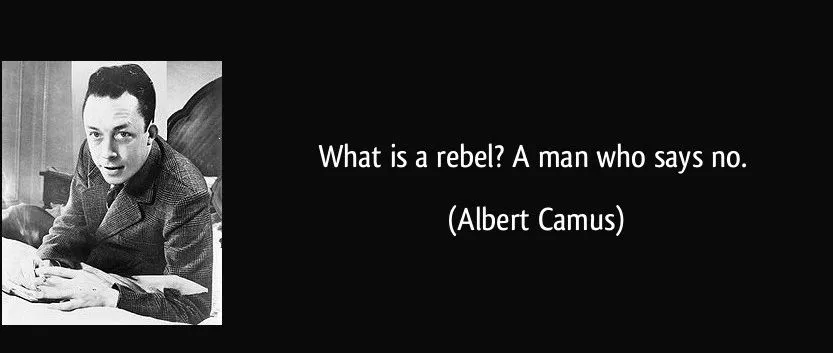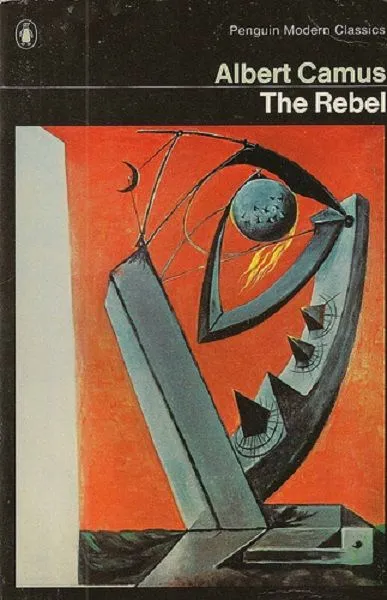The Rebel is a story of rebellion ideas - metaphysical and political - against unfair human deeds. If the main question in the "Myth of Sisyphus" is suicide, then "The Rebel " is concerned with the question of the justice of the murder. People have always murdered each other. The one who kills under the influence of affect is sued and then executed. But today the threat are not these crimes but the state leaders who coolly sent to death millions of people and justify mass murder with the interests of the nation, public safety, the progress of humanity and the logic of history. The man of the 20th century finds himself in the face of totalitarian ideologies that serve to justify the murders. More Pascal in Provincial Letters is appalled by Jesuit's Kazuisticianism, allowing murder in spite of the Christian orders. Undoubtedly, all churches bless the war against heretics, but every Christian knows the maxim "do not kill, because murder is a mortal sin," and the motto of the 20th century is "Kill." Camus in The Rebellious Man follows the genealogy of this maxim of modern ideologies. The problem is that these ideologies have been born out of ideas of rebellion, transforming into the nihilist "everything is allowed".
Camus believes that the starting point of his philosophy remains an absurdity, questioning all the values. Absurd, according to him, prohibits not only suicide but also murder. Own destruction means assassination of the unique source of the meaning of each person's life. One of the absurdities in the "Myth of Sisyphus" does not point out the revolt but affirms the self-worth of the other. The rebellion adds value to individual life, it is "a struggle with the superiority of the intellect", "a denial of reconciliation." Fighting the "plague" remains unreasonable in comparison with Caligula's bloodstaining or bloodshed. In Camus, notions such as absurd and rebellion change their content, hence not the individualistic mutiny, but the need for human solidarity and the common sense of existence for all. The renunciation of slavery simultaneously affirms the freedom, equality and human dignity of everyone. Every rebellious slave can reach this limit, but his desire to dominate makes him a bloody dictator. According to Camus, the revolutionary movement "has never separated from its moral, Christian and ideological roots." Today, the political rebellion has joined with the release of man from all values, and he is therefore involved in tyranny. The metaphysical rebellion itself has justification, so rebellion against the celestial universality of Demiurge means denial of reconciliation and affirmation of the merits of earthly existence. It becomes a denial of all values and engages in brutal self-will when the rebel proclaims himself a "man-god", inheriting from the rejected deity what he hates - absolutism, claims of last and final truth ("the truth is one, the delusions much ") and omniscience. In the earthly paradise, the new Prometheus is ready to demonstrate enormous strength, but even with the slightest resistance he is ready to make such a terror, compared to which the great Inquisition would be a childhood game. Such a compound of metaphysical and historical rebellion is mediated in the "German ideology". In the midst of the rebellious man's work, Camus spoke of "the evil geniuses of Europe bearing the names of philosophers: Hegel, Marx, and Nietzsche ... We live in this Europe, in Europe created by them." Not seeing the obvious differences in the views of these thinkers (and also of Feuerbach), Camus is uniting them in the "German ideology" that generates modern nihilism.

In order to understand his reasons for these thinkers included in the list of "evil geniuses," we first need to take into account the socio-political situation, and secondly, to take into account the angle Camus regards them. Camus wrote "The Rebel" in the 1950s, when the Stalinist system reached the apogee of its majesty, and Marxism became a world ideology. In Eastern Europe there are political courts, the USSR reports about millions arrested, the system is spreading in China, and the war in Korea begins, which may explode in Europe. Camus' political views change in the late 1940s, he no longer thinks of a revolution, tens of millions of victims have been paid to Europe. Camus remains a supporter of socialism. The Socialists strive to free the living people and not to sacrifice the lives of several generations to reach the earthly paradise. These sacrifices are not approaching, but distancing the "kingdom of man" - through the totalitarian regime, human freedom is being abolished. Camus admits a great deal of misinterpretation of the views of Hegel and Marx, but their views are fully understandable. He examines precisely these ideas, which enter into the Stalinist "canon" propagandizing as the only true teachings used to justify bureaucratic centralization and "leadership". In addition, he is arguing with Merlot-Ponty and Sartre wishing to justify totalitarianism with the help of Hegel's "Phenomenology of the Spirit," a study of "the totality of history." The story ceases to be a teacher of life, it is made of inexorable idols that are being offered to new victims. Transcendent values are dissolved in historical views, the laws of the economy engage humanity in the earthly paradise, but at the same time they destroy everyone who opposes them. Object of Camus' views is the tragedy of philosophy turning into "prophecy," into an ideology justifying the dominant terror. The deities of "German ideology" make history, the clergy of the new religion become propagandists and followers. "Prophecy" encompasses its own logic of development, which may have nothing to do with the good intentions of the philosopher-rebel. The question of the responsibility of the thinker, Camus puts quite rightly: neither Marx nor Nietzsche would approve the actions of their "disciples," but their theories can be adapted to the lessons of Kant or Tolstoy, Locke's political theories, or Montesquieu, did not need mass murders.
